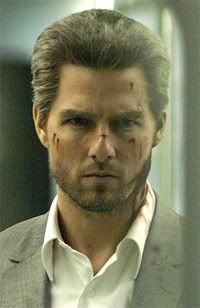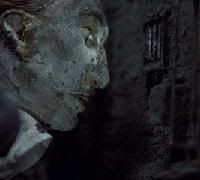Post by Capo on Jan 11, 2006 15:14:14 GMT
Elephant
Director: Gus Van Sant
2003 USA
An ordinary day in a US high school. John drives to school with his drunken dad in the car, leaving the keys at the reception for his brother to come pick up. Elias takes pictures with his camera to build a portfolio. Michelle gets wrong for wearing long pants to gym, and rushes to the school library as the bell rings. Nate and Carrie, boyfriend and girlfriend, discuss their plans for the weekend as they roam the school. Brittany, Jordan and Nicole gossip in the school canteen and, concerned with their weight, force themselves to throw up in the toilets. And Eric and Alex are about to change all of their lives forever.
There is a sense of contradiction about Gus Van Sant’s Elephant. It vows for Rashomon-like multi-faceted drama but feels like a documentary; it covers a fairly simple event but does so in a complicated way; the duration of the film is at first glance a moderate one, though this feels at times like a kind of epic; it also adopts a certain voice-of-the-people tone for its students, though renders them and their world as glib caves of suffocation; and, for an independent film, and evocation of high school life, it comes remarkably close to stereotyping its subjects.
The film’s strength, then, comes not from the individual composites which make it, but the overall feel it conjures up. Kudos to editing, pacing and the brooding, anonymous cinematography, which give a real sense of this being a genuine slice of life, heightened by Van Sant’s on-location shooting and use of non-actors. This sense of modesty begs for a label which has, of late, become a sort of cliché: the anti-drama, in which non-events are given weight by the attention paid to them. The camera spends most of its time tracking characters from behind, through and around the school grounds. Effortlessly photographing them and acting as a tour guide, of sorts, the camera lingers on such dull, commonplace actions such as Elias turning his unexposed film back and forth, or Michelle getting changed after sports, to the point of rendering them important.
Our first glance of Alex and Eric, walking into the school equipped like Special Ops agents, is a powerful moment in that it is the first notion that this ordinary day has the potential to become very different. An invasion, if you like, into the monotony of school life, just moments after Van Sant shows us, in slow motion, John teasing a student’s dog. It is an effective precursor to the events about to unfold, and Van Sant maintains interest in cutting away from this and going back in time.
Perhaps the reason why the film holds much of its power is due to the matter-of-factness with which Van Sant depicts his action. It may have been easier to dramatise the events, loosely based on the Columbine tragedy, into blaming Alex and Eric, and having a central hero to connect the episodic storylines. The opening chapter, of sorts, invites us to empathise with John, as he forces his drunken father to switch seats so he can drive to school and avoid further embarrassment. It may be a common expectation that John is in fact our lead player, here, and, assuming we know the premise of the film, that he is even one of the killers. That he turns out to be a rather secondary player—indeed, nobody stands out—pays testament to Van Sant’s clever, subtle manipulation of our expectations. The director again manipulates our expectations towards the end of the film, with the late introduction of Benny, a new character. Moments later, he is dead.
It would be, however, all too easy to take morals from the story, that “It’s the silent ones you’ve got to watch” or something along similar lines. Later on in the film, towards its climax, one of the killers lectures the principle; it is a moment which comes dangerously close to rationalising an event best left unsolved—that is, to succumb to blaming anything here would be too easy a solution. With this in mind, it seems too cautious and safe to have the would-be killers watch a documentary on Hitler as their first weapons arrive through mail.
That Van Sant spends so long establishing the characters for us makes the climax all the more powerful. The final twenty minutes of the film are amazingly executed (pardon the pun), as Alex and Eric pick off with ease their screaming victims. The first use of their weapons, in the library, on Michelle, is a cold, blunt and shocking way to change the course of events from merely brooding to seriously real. The centrepiece to the film, where editing becomes its most protracted, is where Alex plays Beethoven on his piano, the camera panning full circle round the room. When he finally finishes the piece, he gives it two middle fingers, and then gets down to more serious business: playing a violent shoot-em-up videogame and searching for guns online. A critique of his own country’s gun culture, and a convincing attack on the dangers of glorification of such weapons, Elephant is a haunting depiction of human tragedy.
CREW
Director
Gus Van Sant
Producer
Dany Wolf
Writer
Gus Van Sant
Cinematography
Harris Savides
Film Editing
Gus Van Sant
CAST
Alex Frost
Alex
Eric Deulen
Eric
John McFarland
John
Elias McConnell
Elias
Jordan Taylor
Jordan
Carrie Finklea
Carrie
Nicole George
Nicole
Brittany Mountain
Brittany
Alicia Miles
Arcadia
Kristen Hicks
Michelle
Bennie Dixon
Benny
Nathan Tyson
Nathan
Director: Gus Van Sant
2003 USA
An ordinary day in a US high school. John drives to school with his drunken dad in the car, leaving the keys at the reception for his brother to come pick up. Elias takes pictures with his camera to build a portfolio. Michelle gets wrong for wearing long pants to gym, and rushes to the school library as the bell rings. Nate and Carrie, boyfriend and girlfriend, discuss their plans for the weekend as they roam the school. Brittany, Jordan and Nicole gossip in the school canteen and, concerned with their weight, force themselves to throw up in the toilets. And Eric and Alex are about to change all of their lives forever.
There is a sense of contradiction about Gus Van Sant’s Elephant. It vows for Rashomon-like multi-faceted drama but feels like a documentary; it covers a fairly simple event but does so in a complicated way; the duration of the film is at first glance a moderate one, though this feels at times like a kind of epic; it also adopts a certain voice-of-the-people tone for its students, though renders them and their world as glib caves of suffocation; and, for an independent film, and evocation of high school life, it comes remarkably close to stereotyping its subjects.
The film’s strength, then, comes not from the individual composites which make it, but the overall feel it conjures up. Kudos to editing, pacing and the brooding, anonymous cinematography, which give a real sense of this being a genuine slice of life, heightened by Van Sant’s on-location shooting and use of non-actors. This sense of modesty begs for a label which has, of late, become a sort of cliché: the anti-drama, in which non-events are given weight by the attention paid to them. The camera spends most of its time tracking characters from behind, through and around the school grounds. Effortlessly photographing them and acting as a tour guide, of sorts, the camera lingers on such dull, commonplace actions such as Elias turning his unexposed film back and forth, or Michelle getting changed after sports, to the point of rendering them important.
Our first glance of Alex and Eric, walking into the school equipped like Special Ops agents, is a powerful moment in that it is the first notion that this ordinary day has the potential to become very different. An invasion, if you like, into the monotony of school life, just moments after Van Sant shows us, in slow motion, John teasing a student’s dog. It is an effective precursor to the events about to unfold, and Van Sant maintains interest in cutting away from this and going back in time.
Perhaps the reason why the film holds much of its power is due to the matter-of-factness with which Van Sant depicts his action. It may have been easier to dramatise the events, loosely based on the Columbine tragedy, into blaming Alex and Eric, and having a central hero to connect the episodic storylines. The opening chapter, of sorts, invites us to empathise with John, as he forces his drunken father to switch seats so he can drive to school and avoid further embarrassment. It may be a common expectation that John is in fact our lead player, here, and, assuming we know the premise of the film, that he is even one of the killers. That he turns out to be a rather secondary player—indeed, nobody stands out—pays testament to Van Sant’s clever, subtle manipulation of our expectations. The director again manipulates our expectations towards the end of the film, with the late introduction of Benny, a new character. Moments later, he is dead.
It would be, however, all too easy to take morals from the story, that “It’s the silent ones you’ve got to watch” or something along similar lines. Later on in the film, towards its climax, one of the killers lectures the principle; it is a moment which comes dangerously close to rationalising an event best left unsolved—that is, to succumb to blaming anything here would be too easy a solution. With this in mind, it seems too cautious and safe to have the would-be killers watch a documentary on Hitler as their first weapons arrive through mail.
That Van Sant spends so long establishing the characters for us makes the climax all the more powerful. The final twenty minutes of the film are amazingly executed (pardon the pun), as Alex and Eric pick off with ease their screaming victims. The first use of their weapons, in the library, on Michelle, is a cold, blunt and shocking way to change the course of events from merely brooding to seriously real. The centrepiece to the film, where editing becomes its most protracted, is where Alex plays Beethoven on his piano, the camera panning full circle round the room. When he finally finishes the piece, he gives it two middle fingers, and then gets down to more serious business: playing a violent shoot-em-up videogame and searching for guns online. A critique of his own country’s gun culture, and a convincing attack on the dangers of glorification of such weapons, Elephant is a haunting depiction of human tragedy.
CREW
Director
Gus Van Sant
Producer
Dany Wolf
Writer
Gus Van Sant
Cinematography
Harris Savides
Film Editing
Gus Van Sant
CAST
Alex Frost
Alex
Eric Deulen
Eric
John McFarland
John
Elias McConnell
Elias
Jordan Taylor
Jordan
Carrie Finklea
Carrie
Nicole George
Nicole
Brittany Mountain
Brittany
Alicia Miles
Arcadia
Kristen Hicks
Michelle
Bennie Dixon
Benny
Nathan Tyson
Nathan









